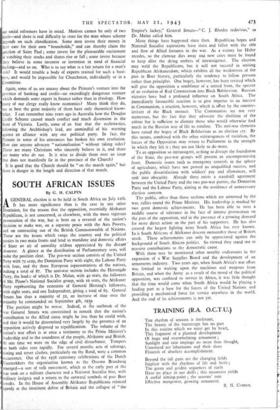SOUTH AFRICAN ISSUES
By G. H. CALPIN GENERAL election is to be held in South Africa on July rich.
It has more significance than is the case in any other Dominion, for the reason that the opposition, essentially Afrikaner e Republican, is not concerned, as elsewhere, with the more vigorous prosecution of the war, but is bent on a reversal of the nation's decision to make war, on a separate peace with the Axis Powers, and on contracting out of the British Commonwealth of Nations. These are the issues which range the country and the political parties in two main fronts and lend to mundane and domestic affairs of State an air of unreality seldom appreciated by the distant" observer. A glance at the distribution of Parliamentary seats will make the position clear. The pro-war section consists of the United Party with 72 seats, the Dominion Party with eight, the Labour Party with four, and the three European representatives of the natives, making a total of 87. The anti-war section includes the Herenigde Party, the leader of which is Dr. Malan, with 4o seats, the followers of Mr. Pirow's National Socialist group, with 16 seats, the Afrikaner Party representing the remnants of General Hertzog's followers, with eight seats, and one Independent, giving a total of 65. General Smuts has thus a majority of 22, an increase of nine over the majority he commanded on September 4th, 1939. The position might be worse. Indeed, at ale outbreak of the war General Smuts was constrained to remark that the nation's contribution to the Allied cause might be less than he could wish, and that it would be determined very largely by the presence of an opposition actively disposed to republicanism. The volume of the nation's war effort is at once a testimony to the Prime Minister's leadership and to the soundness of the people, Afrikaner and British. At one time we were on the edge of civil disturbance. Tempers on both sides rose rapidly. For several months acts of sabotage, rioting and street clashes, particularly on the Rand, were a common occurrence. Out of the 1938 centenary celebrations of the Dutch Voortreldeers the organisation known as the Ossewa Brandwag emerged—a sort of yolk movement, which in the early part of the war took on a militant character and a National Socialist bias, with military insignia and a return to the outward symbols of past Boer revolts. In the House of Assembly Afrikaner Republicans rejoiced openly at the imminent defeat of Britain and the collapse of " the
Empire's lackey," General Smuts—" C. J. Rhodes redivivus," as Dr. Malan called him.
Many things have happened since then. Republican hopes and National Socialist aspirations have risen and fallen with the ebb and flow of Allied fortunes in the war. As a victory for Hitler recedes, so the clamour dies away and new cries must be found to keep alive the dying embers of intransigence. The election may weld the Republicans, but it will not succeed in uniting Republican Afrikanerdom, which exhibits all the weaknesses of the past in Boer history, particularly the tendency to follow persons rather than principles. One bogey, however, has been revived which will give the opposition a semblance of a united front, the spectre of an evolution of Red Communism into Black Bolshevism. Russian victories have had a profound influence on South Africa. The immediately favourable reaction is to give impetus to an interest in Communism, a reaction, however, which is offset by the counter- irritant of the Black menace. The Communists are not very numerous, but the fact that they advocate the abolition of the colour bar is sufficient to alienate those who would otherwise find much in the Russian way of life to emulate. The anti-war elements have raised the bogey of Black Bolshevism as an election cry. By this means, combined with the other extravagances of racialism, the forces of the Opposition may return to Parliament in the strength in which they left it ; they are not likely to do more.
To an opposition so intransigent, seeking to disrupt the foundation of the State, the pro-war groups will present an uncompromising front. Domestic issues such as emergency controls in the sphere of agriculture, which have not proved an unqualified success, and the public dissatisfaction with soldiers' pay and allowances, will sink into obscurity. Already there exists a standstill agreement between the United Party and the two pro-war parties, the Dominion Party and the Labour Party, aiming at the avoidance of unnecessary election contests.
The public, other than those sections which are unmoved by the war, rallies round the Prime Minister. His leadership is marked by two great domestic achievements. He has been able to steer a Middle course of tolerance in the face of intense provocattqn on the part of the opposition, and in the presence of a growing demand for more direct action on the part of his supporters. He has also created the largest fighting army South Africa has ever known. In it South Africans of Afrikaner descent outnumber those of British stock. These achievements can only be appreciated against the background of South African politics. So viewed they stand out as massive contributions to the democratic cause.
With them may be mentioned other notable endeavours in the expansion of a War Supplies Board and the development of an armaments industry. Two years ago, when South Africa's war effort was limited to waiting upon the machines and weapons from Britain, and when the Army as a result of the mood of the political opposition, was confined to service in Africa, it was little thought that the time would come when South Africa would be playing a leading part as a base for the forces of the United Nations and providing a mechanised force for service anywhere in the world. And the end of its achievements is not yet.


























 Previous page
Previous page